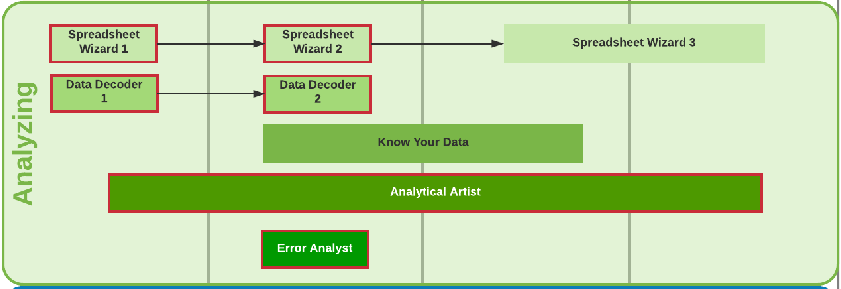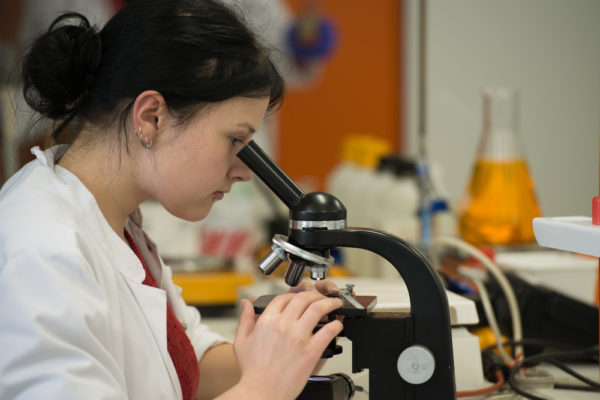As educators, we know that science is not just a body of knowledge, but it is a process that enables people to answer questions through scientific inquiry. Scientists conduct inquiries using a specific toolbox of skills and knowledge that the Next Generations Science Standards (NGSS) has spelled out for emerging scientists as so-called “science and engineering practices,” or practices that increase in complexity and sophistication across grade levels.
These are important skills for students to master, not least because of the growing demand for science and STEM professionals. Here in California, like other states nationwide, the STEM job market is rapidly growing but students are still graduating without the skills and knowledge needed to fill these high-paying jobs. In fact, the Bureau of Labor Statistics projects that California will have the largest STEM workforce in the country by 2022.
The question is, how do you ensure students are graduating with these skills in a way that sets them up for future college and career success?
It was in with that question in mind, with support from the Escondido community and business leaders, that Del Lago Academy (DLA) opened in 2013 with the purpose of creating a school-to college and career pipeline connecting local students to STEM related careers within our region in southern California. DLA was designed around a core academic program that engages students in real-world learning that better prepares them for success in college and career in this high-demand, fast-growing field.
During the last three years, the DLA science department has worked hard to make learning social, emotional, and linked to the science-based internships that our scholars access during 11th and 12th grade. (We began referring to our students as scholars, because we expected that they take an active approach to their education, and participate in interdisciplinary project-based learning, and internships.) But there was still concern from our science teachers that we weren’t doing enough to ensure scholars were able to transfer skills and knowledge from the laboratory setting, to to apply them in real-world settings and scenarios.
To address this challenge, we began brainstorming ideas about how to advance assessment to better promote success in these internships and students’ future college and career experiences. With support from the Next Generation Learning Challenges and the Assessment for Learning Project, we developed a competency-based assessment approach called Competency X, which is personalized for our learners and results in digital badges that are validated by local industry and college partners to prepare them for internships and post-secondary work.
So, how do we do it?
Collaborating with partners
To make Competency X a success, it was vital that we know which foundational science-based skills industry partners seek in employees and interns. We co-created the badges in a Summer Workshop with teachers, scholars, and industry and college partners who collaborated to ensure that scholars are focused on the most important skills, knowledge, and dispositions for success. Together, we identified high-demand and foundational science-based skills. For example, dispositions like humility, independence, and persistence were proposed alongside more traditional science-based practices in NGSS like analyzing data or engaging in argument. We used this rich information, as well as teacher proposed learning progressions on science and engineering practices to build digital badges that validate mastery of skills and practices.
Next page: A unique badging model engages students
Mapping out what success looks like
An essential element of the badging system is that it immerses scholars in a personalized learning ecosystem in which they track their learning and reflect on their their growth as they work toward earning a badge. The digital badge is merely the destination—it connotes evidence of a competency—but our program challenges students to engage deeply in their own learning as they progress toward that destination. What does that progress look like? Each badge maps out a hypothesized learning progression on how our scholar’s ability to use scientific practices develop and become more sophisticated over time, and there are badges relating to experimentation, analyzation, and communication. The progression map facilitates for our scholars what one excited scholar coined as “questy,” or the ability for scholars to easily set goals and track their progress on a pathway to success beyond the classroom. Below is an example of the badges from the Analyzing portion of the progression map.

Using badging to facilitate student-led learning
Scholars use a digital portfolio to curate evidence and reflect on how that evidence represents their personalized path toward reaching a competency. In this way, scholars build a comprehensive picture of what they know and can do as practicing scientists. Scholars then use the digital badge to validate they have attained the specific knowledge and skills required to be a scientist for their internships and their college applications. The digital portfolio and digital badging process also makes Competency X a valuable alternative to traditional summative assessments that too often emphasize accountability instead of reflecting scholar growth and self-agency.
Assessing comprehensive skills that really matter in college and career
Importantly, these badges are filling in gaps for what gets assessed in interesting ways that are grounded in real-world industry skill needs. For example, we have a series of Skeptic badges based on the idea of critiquing failed interpretations by the popular media of science research, and an Elevator Pitch badge that requires scholars to deliver a pitch or explanation of what they completed in the lab. These disposition oriented badges complement our more traditional science- and engineering-based practice badges (e.g., Data Decoding, Analytical Techniques, Spreadsheet Wizard, and Visual Explanation).
Connecting scholars to real workforce opportunities
All of our 11th graders participate in a 6-week internship during the school year. We plan on using the digital badges for scholars to earn internships based on what they really can do, matching competencies with relevant work opportunities that are enriching learning experiences for each scholar to practice their skills. We’ve created clickable scholar resumes with links to the evidence of their competency in their digital portfolio to provide potential employers with transparent, clear and comprehensive details about the skills and practices that each badge represents.
Getting the most out of internship opportunities
Continued collaboration with industry partners is key to making internships useful for both scholars and employers. For example, after getting feedback from our industry partners, we enhanced the internship program to give it a more student-driven nature: now, students can ask for an internship that features specific skill-building experiences that will result in earning a badge. In this way, the internship programs are an excellent opportunity for real workforce experience to validate badges.
Improving badges to support scholars’ success
Rich industry and higher education partnerships allow us to maintain an open feedback loop to continuously improve badges, so that they better capture competencies and can accurately match qualified scholars with the right employers to hone the most relevant skills. From these partnerships, we are connecting directly with the workforce to better understand what success looks like for our scholars. With continuous feedback, we can modify the badges and the learning progression of practices so they serve as an accurate interpretation of competency within the science workforce—in other words, to make sure badges are meaningful and valid for potential employers, and that they have real-world merit for our scholars.
Competency X was designed to be more than just a digital badging system that represents mechanistic skills that are checked off by the learner and are divorced from big questions that inspire what we call “nerdy delight.” Nerdy delight is that feeling you get in scientific inquiry when you accomplish something that you did not think was previously possible—through our badging system, scholars tap into that excitement of inquiry through student-led learning.
We want our scholars to reflect deeply on their own learning, to know and truly understand the skills they’ve learned and their applicability in the laboratory, workforce, or post-secondary education — and ultimately to be excited and prepared for boundless success in college and career.
- TC- What student choice and agency actually looks like - November 15, 2016
- What student choice and agency actually looks like - November 14, 2016
- App of the Week: Science sensor meets your smartphone - November 14, 2016


